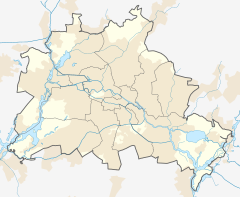Berlin City Palace
| City Palace Stadtschloss |
|
|---|---|

The Stadtschloss in the 1920s
|
|
|
Location within Berlin
|
|
| General information | |
| Architectural style | Baroque |
| Location | Mitte, Berlin, Germany |
| Construction started | 1443 (original) 2013 (reconstruction) |
| Completed | 1845 (original) 2019 (reconstruction) |
| Demolished | heavily damaged by Allied bombing in 1945; demolished by GDR in 1950 |
| Client | Joachim II Hector, Elector of Brandenburg, John George, Elector of Brandenburg, John Sigismund, Elector of Brandenburg, Frederick Wilhelm I of Prussia, Frederick the Great, Frederick William III of Prussia, Frederick William IV of Prussia, Wilhelm I, German Emperor, Friedrich III, German Emperor, Wilhelm II, German Emperor |
| Design and construction | |
| Architect | Andreas Schlüter, Karl Friedrich Schinkel |
The Berlin City Palace (German: Berliner Stadtschloss) was a royal and imperial palace in the centre of Berlin, the historical capital of Prussia, and subsequently Germany. It was located on the Museum Island at Schlossplatz, opposite the Lustgarten park. It was the winter residence of the Kings of Prussia and the German Emperors. In 2013 work started on reconstruction and a part of the exterior of the palace has been rebuilt. The completion is expected in 2019. The reconstructed palace will house the Humboldt Forum, a world centre for culture which has been described as the German equivalent of the British Museum.
The palace was originally built in the 15th century and changed throughout the next few centuries. It bore features of the Baroque style, and its shape, finalised by the middle 18th century, is attributed to German architect Andreas Schlüter, whose first design is likely to date from 1702, though the palace incorporated earlier parts seen in 1688 by Nicodemus Tessin. It served as a residence to various Electors of Brandenburg. It was the principal residence and winter residence of the Hohenzollern Kings of Prussia from 1701 to 1918. After the unification of Germany in 1871, it was also the central residence for the German Emperors. It became a museum following the fall of the German Empire in 1918. The palace was heavily damaged by Allied bombing in World War II. Although it could have been repaired, the palace was demolished in 1950 by the German Democratic Republic authorities, despite criticism.
...
Wikipedia

